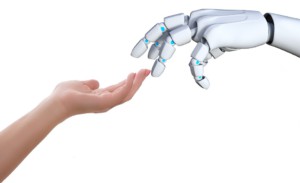 Industry 4.0 is one of the hot topics of modern manufacturing, although some (myself included) say that it is overrated. Lean is one of the older but also still important topics in manufacturing. In this post I would like to compare lean and Industry 4.0. What are the differences, what are the commonalities? Can they complement each other or do they conflict?
Industry 4.0 is one of the hot topics of modern manufacturing, although some (myself included) say that it is overrated. Lean is one of the older but also still important topics in manufacturing. In this post I would like to compare lean and Industry 4.0. What are the differences, what are the commonalities? Can they complement each other or do they conflict?
This post is based on a presentation I did on June 13, 2018 at the very well-organized and interesting 18th Lean Management Conference for Production and Services in Wroclaw, Poland. They also provide videos of the presentations, hence you can also watch me below :).
Introduction
Industry 4.0 is all about using computer technology, artificial intelligence, and especially networks to improve production. To me, it is a bit over-hyped, and there are much more ideas and visions than things that actually work. See my posts A Critical Look at Industry 4.0 for my , well, critical look, and Industry 4.0 – What Works, What Doesn’t for, well, what works and what doesn’t.
Overall, it is not very well defined what Industry 4.0 actually is besides a German research program. We are also not sure how it differs from Digital Manufacturing (1970s), Computer Integrated Manufacturing (CIM) (1990s), Digital Factory (2000), Factory 2.0 (from 2005), and the Smart Factory (from 2007), all of which had big promises but few actual results.
 Lean Production has been around for half a century or more, developed by Toyota from 1950 onward as the Toyota Production System. Like Industry 4.0, lean is also not well defined. It includes Just in Time and Jidoka as well as Muda, Mura, Muri (waste, unevenness, overburden), respect for people, and many other things. I worked for Toyota for five years, and I am a strong fan of lean, hence keep in mind I may be a bit biased. Nevertheless, even in lean a lot of the projects fail or show no significant improvement.
Lean Production has been around for half a century or more, developed by Toyota from 1950 onward as the Toyota Production System. Like Industry 4.0, lean is also not well defined. It includes Just in Time and Jidoka as well as Muda, Mura, Muri (waste, unevenness, overburden), respect for people, and many other things. I worked for Toyota for five years, and I am a strong fan of lean, hence keep in mind I may be a bit biased. Nevertheless, even in lean a lot of the projects fail or show no significant improvement.
Similarities between Lean and Industry 4.0
 Lean and Industry 4.0 do have a lot of similarities. A good implementation requires your full attention and support as well as a lot of time from both you and your people. If you overload your people and start too many projects at once, you will not get them finished, and even if you think they are done, they do not work very well. A key part of lean is to limit the work in progress to make the actual work easier. I strongly believe the same applies to projects.
Lean and Industry 4.0 do have a lot of similarities. A good implementation requires your full attention and support as well as a lot of time from both you and your people. If you overload your people and start too many projects at once, you will not get them finished, and even if you think they are done, they do not work very well. A key part of lean is to limit the work in progress to make the actual work easier. I strongly believe the same applies to projects.
This cannot be outsourced. If you just hire some people to do the work for you, it will not give you what you want. Even though it may look good, it probably won’t work as intended. Don’t get me wrong, external people can definitely help, but it is far from a “fire and forget” approach.
No matter if you are doing lean or doing Industry 4.0, PDCA (Plan, Do, Check, Act) is essential for success. While anything can look good in a presentation, the important part is if it actually works on the shop floor. Hence especially the Check and Act parts are important for success.
In both lean and Industry 4.0, most implementations fail due to lack of PDCA. And the failure rate is drastic. For lean, there are numerous sources stating that 70% to 90% of all lean projects do not bring any measurable benefit, and I believe that number. I have not yet seen similar sources on Industry 4.0, but my own personal experience would put the failure rate of Industry 4.0 projects also between 70% and 90%.
However, if you are one of the lucky 10% to 30% where lean and/or Industry 4.0 works, it can make a huge difference for your business. Both lean and Industry 4.0 have the potential to significantly reduce lead time, improve quality, and overall improve the profitability of the operation – if it is done right!
Differences between Lean and Industry 4.0
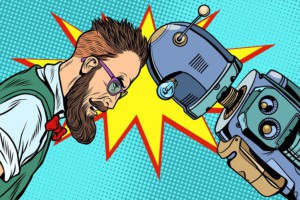 There are also many differences between lean and Industry 4.0. Working with People is an essential part of lean, and lean looks at their needs and how they interact with each other. Industry 4.0, however, focuses on computers, automation, and robotics. The ultimate goal of Industry 4.0 is the lights-out factory, where there are no people left. Of course, there are also papers that claim that the workers are essential to Industry 4.0, but to me this feels fake. Something like “You are important, so shut up and do your work until you are replaced by a robot.”
There are also many differences between lean and Industry 4.0. Working with People is an essential part of lean, and lean looks at their needs and how they interact with each other. Industry 4.0, however, focuses on computers, automation, and robotics. The ultimate goal of Industry 4.0 is the lights-out factory, where there are no people left. Of course, there are also papers that claim that the workers are essential to Industry 4.0, but to me this feels fake. Something like “You are important, so shut up and do your work until you are replaced by a robot.”
As for the use of computers, lean is not hostile to computers. If the best solution includes a computer, then lean will happily use computers, automation, networks, and any other computer-related aspects too. Industry 4.0, however, pretty much has to pick the computer solution over the conventional one. Computers and computer-free solutions both have benefits and disadvantages. My gut feeling is, however, that in most industries, the advantages of the computers are overestimated, and the problems overlooked.
Another difference is the speed of the change. Lean often has easy and quick-fix solutions as for example Karakuri Kaizen. Especially in Japan they often prefer the quick and dirty solution over an expensive and cumbersome one. As long as it works, it is good. Industry 4.0 on the other hand is hardware- and software-heavy. Any change requires a programmer and technicians, which are usually in short supply. Therefore, an Industry 4.0 implementation will take much more time, whereas a lean implementation can (not always but often) be faster.
Another related difference is flexibility. Industry 4.0 often does not have much flexibility. Of course, the goal is to flexibly produce any part you want anytime. But if you need to change the actual production system, Industry 4.0 takes much more time and money. In terms of complexity, this rivals an ERP change. If you work with ERP systems, think back to the last software update, version change, or – shudder – a complete change to a different ERP software vendor. It probably was very expensive and messy. The same applies to Industry 4.0. In my view, Industry 4.0 actually reduces flexibility. Lean, on the other hand, prefers to make many small steps over big leaps, as this will help your learning curve and give you more time to correct mistakes. It also encourages fast and flexible changes to improve quicker.

Finally, there is the topic of continuous improvement. The idea of always improving is one of the cornerstones of lean manufacturing. However, due to the slower speed of changes and implementations in Industry 4.0, most Industry 4.0 applications are what I would call “monuments.” Very expensive, and once they are there, they are difficult to change. Hence, Industry 4.0 is often a one-shot approach that may (or may not) work.
A Quick Survey
During my presentation at the Lean Management Conference in Poland, I presented the audience with different Venn diagrams on how lean and Industry 4.0 interact, and also asked for their opinion in which one they believe most.
 The first option was a complete separation of Industry 4.0 and lean; they have nothing to do with each other. Around seven or eight people in the audience believed this to be the most likely scenario.
The first option was a complete separation of Industry 4.0 and lean; they have nothing to do with each other. Around seven or eight people in the audience believed this to be the most likely scenario.
The second option was that 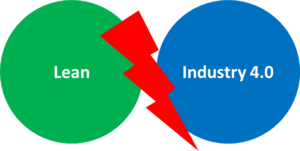 lean and Industry 4.0 are actually in conflict with each other and actively fight for dominance or importance on the shop floor. In other words, it would be either lean or Industry 4.0, but a combination is not possible. Also around seven or eight people in the audience preferred this scenario, similar to the “completely separate” approach above.
lean and Industry 4.0 are actually in conflict with each other and actively fight for dominance or importance on the shop floor. In other words, it would be either lean or Industry 4.0, but a combination is not possible. Also around seven or eight people in the audience preferred this scenario, similar to the “completely separate” approach above.
 The third option showed Industry 4.0 as a subset of lean. Everything Industry 4.0 does can be seen as part of the lean methodology. Of course, for me as a lean guy, I see everything through lean glasses, so … take that, you scummy digital wannabe pretender … ahem … sorry. To be honest, this would not have been my preferred Venn diagram. However, a large group of the audience saw it this way – although with this being a Lean Management Conference, people may also have been biased in favor of lean.
The third option showed Industry 4.0 as a subset of lean. Everything Industry 4.0 does can be seen as part of the lean methodology. Of course, for me as a lean guy, I see everything through lean glasses, so … take that, you scummy digital wannabe pretender … ahem … sorry. To be honest, this would not have been my preferred Venn diagram. However, a large group of the audience saw it this way – although with this being a Lean Management Conference, people may also have been biased in favor of lean.
 The next scenario was the other way round, with lean being a subset of Industry 4.0, and anything lean does is included within Industry 4.0. (What?!?!? Come here, you buggy pile of transistors. I’ll show you how manufacturing works!). Surprisingly, this was the most likely scenario for one person in the audience. He said that this may be the most realistic scenario.
The next scenario was the other way round, with lean being a subset of Industry 4.0, and anything lean does is included within Industry 4.0. (What?!?!? Come here, you buggy pile of transistors. I’ll show you how manufacturing works!). Surprisingly, this was the most likely scenario for one person in the audience. He said that this may be the most realistic scenario.
 Another scenario is that there is an overlap between lean and Industry 4.0. They share ideas and visions and have to work together, but there are also a lot of distinct parts. This was also the preference for a significant group of the audience, and this would also be my preferred view of the world.
Another scenario is that there is an overlap between lean and Industry 4.0. They share ideas and visions and have to work together, but there are also a lot of distinct parts. This was also the preference for a significant group of the audience, and this would also be my preferred view of the world.
 Finally, the last scenario sees lean and Industry 4.0 as identical. There is no difference between lean and Industry 4.0; it is all the same thing. A few people also believed this to be the most likely scenario.
Finally, the last scenario sees lean and Industry 4.0 as identical. There is no difference between lean and Industry 4.0; it is all the same thing. A few people also believed this to be the most likely scenario.
The surprise for me was that for every one of these scenarios above, at least one person voted it to be the most likely one. There was not even a clear winner, with both the scenario of Industry 4.0 being a subset of lean and the scenario with an overlap having a similar number of votes. Quite surprising. Anyway, as always, I hope this post was insightful to you. Now, go out, and no matter if you do lean or industry 4.0 or both, organize your industry!
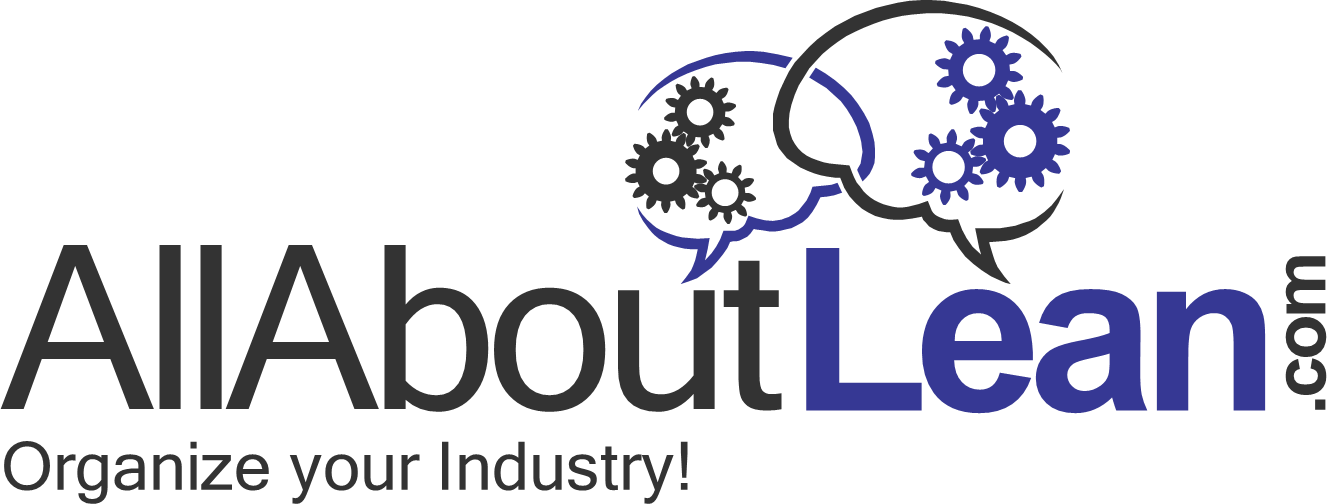
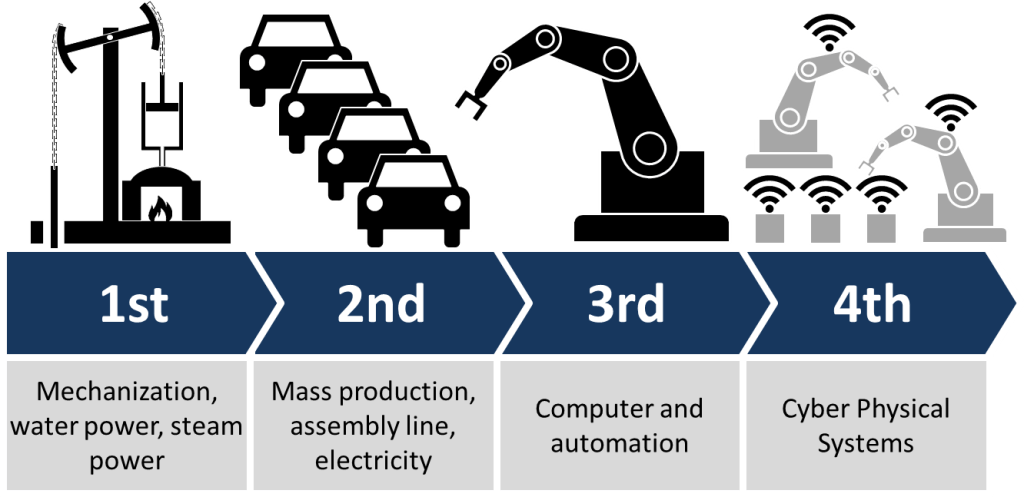
I believe that Lean (above all) is a way of life, I way of thinking. a mindset.
It is about getting better each day, no matter what industry or profession.
Robots (at least for 2018) can’t do that. Robots also can’t link improvement to business strategy/problem (the purpose). people do that. Industry 4.0 can help us “see” the problem better, work smarter perhaps, but is can’t replace the human problem solving and human PDCA.
Also, Robots, Sensors and IoT (Etc..) can’t lead and coach people to be better. Lean leadership can do that. SO, industry 4.0 is great but only as part of lean. Lean is to be a better human beings that creates better (not human) products.
Technology should be used to provide human insights, to increase rate of improvement. In this context Industry 4.0 is an interesting concept for a new level of autonomation (automation with human touch).
I think Industry 4.0 want with use of digital tehnology to achieve the same effects like Lean: Value for customers, eliminate all kind of waste, involve all workers in creative activities and continius to improve.
So it is a matter of tools and tactics.
Last scenario as well. What was not mentioned strongly enough was the culture change between lean and Mfg 4.0. Many in lean will say, ” this task of putting 4 screws in a plate has harsh ergonomic obstacles. At low cost, lets add an ergo arm to the driver with auto screw fee, or at medium let’s add a x-y-z screw machine and re-balance the line. Mfg 4.0 may say lets spend lots of money and get a robot to put the screws in.
If our people are our most import asset because of our ingenuity and thinking talents, do we shift to a thinking level of, our most important asset’s are non-interactive robots.
I always thought lean integrates people with their environment and equipment for harmonious / balanced flow. May be the world is ready for the equipment to integrate with people and their environment for harmonious flow.
I think I’m about ready for A.I. to think for me so that I don’t have to expand energy on thought, or too much caffeine this morning.
Great way of organizing ideas. Really liked the 6 scenarios approach.
I’ve been under the lean concepts for my all profissional life, since ’97 when I signed in as a Coop for the Ford Production System. Now 20 years later I got myself overwelmed again with the potential new leap we are about to make as a civilization.
I’ve ellected I4.0/IoT/AI my next theme of thinking & reflexion. I’m just starting to go into it, but I’ve already my first hypothesis of study formullated:
H0: Will I4.0 currently disadvantages be overcome with AI built into the devices/frameworks/governance models?
Examples:
Will AI decide the best line layout for the time being demand.
Will AI be able to bid for a tender, knowing its cost structure, OEE, availability & geography?
Will AI services be able to counsel you in your carrer/legal affairs, etc, better and at a fraction of a cost?
But again I’m just giving some though into such theme. I don’t even know if you put AI into I4.0 or if is something else in your perspective…but if AI fundamental/basic thinking principles be our currently ones, practiced through lean thinking, then ‘organizations’ ruled with the support of AI will be by definition potential ‘Lean organizations’!
Lean and Industry 4.0 (Smart factory) solutions should work together to realise the untapped potentials in Production. We should never see (in my opinion) lean and industry 4.0 as two different things or concepts. I would like to support my statement with the following examples.
***There is no point in successfully implementing an industry 4.0 solution without following Pull principle in production. At the same time, there is no point in doing a lot preventive maintenance activites on the bottleneck machines instead of following predictive maintenance.***
Another example
*** On one hand, lean tools like Value stream mapping etc will help us in identifying improvement potentials in our production, on the other hand, industry 4.0 solutions or concepts like Predictive maintenance etc would help us in realising the identified potentials. This is just one such example.
Therefore, it is very clear that lean and industry 4.0 concepts should work together, atleast in production, for attaining better results.